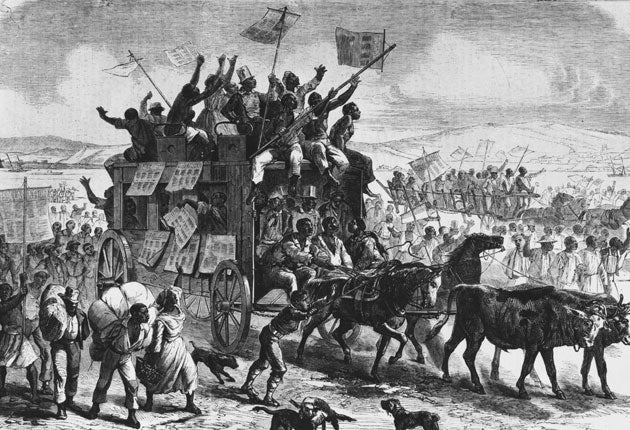Lincoln asked Britain to help set up colony for freed slaves
President had 'secret talks' with British to set up a Belize settlement

Abraham Lincoln told freed slaves they should found a colony in Latin America, and even made contact secretly with the British about making land available in what was then British Honduras, now Belize, according to a new book.
As America celebrates the 150th anniversary of Lincoln's first inauguration this week, a new book by researchers at George Mason University in Fairfax, Virginia, makes the case that Lincoln was more committed to colonising black people than previously thought. The book, Colonization After Emancipation, is based in part on newly uncovered documents that authors Phillip Magness and Sebastian Page found at the British National Archives in Kew and in the US National Archives.
It claims, among other things, that in 1862 Lincoln urged a White House audience of "free blacks" to leave the US and settle in Central America. He told them: "For the sake of your race, you should sacrifice something of your present comfort for the purpose of being as grand in that respect as the white people." He went on to say that those who envisioned a permanent life in the US were being "selfish" and he promoted Central America as an ideal location "especially because of the similarity of climate with your native land – thus being suited to your physical condition".
Lincoln's views about colonisation are well known to historians, even if they don't make it into most schoolbooks. Lincoln even referred to colonisation in the preliminary Emancipation Proclamation, his September 1862 warning to the South that he would free all slaves in southern territory if the rebellion continued.
Unlike some others, Lincoln always promoted voluntary, rather than enforced, colonisation. But historians differ on whether or not he moved away from the concept after he issued the Emancipation Proclamation on 1 January 1863.
The new book suggests Lincoln continued to support colonisation, engaging in secret diplomacy with the British to establish a colony in British Honduras. Among the records found at Kew is an 1863 order from Lincoln granting a British agent permission to recruit volunteers for a colony.
"He didn't let colonisation die off. He became very active in promoting it in the private sphere, through diplomatic channels," Mr Magness said. He surmises that Lincoln grew weary of the idea which had become enmeshed in scandal and were criticised by many abolitionists.
Dr Magness found a notation from as late as 1864 that Lincoln asked the attorney general whether he could continue to receive counsel from James Mitchell, his colonisation commissioner, even after Congress had withdrawn funding for the office. However, Tom Schwartz, a research director at the Abraham Lincoln Presidential Library in Illinois, said that there is evidence that Lincoln's views evolved away from colonisation in the final years of the civil war.
Lincoln gave several speeches referring to the rights black people had earned by enlisting in the Union Army, for instance. And his secretary John Hay wrote in July 1864 that Lincoln had "sloughed off" colonisation. "Most of the evidence points to the idea that Lincoln was looking at other ways" to resolve the transition from slavery, besides colonisation, at the end of his presidency, Dr Schwartz said.
Dr Magness said that nobody can claim definitive knowledge of Lincoln's views, especially on a topic as complex as race relations. "He never had a chance to complete his vision. Lincoln's racial views were evolving at the time of his death," he said.
Subscribe to Independent Premium to bookmark this article
Want to bookmark your favourite articles and stories to read or reference later? Start your Independent Premium subscription today.

Join our commenting forum
Join thought-provoking conversations, follow other Independent readers and see their replies